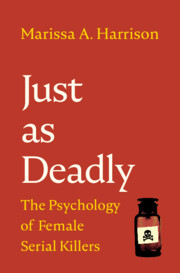Refine search
Actions for selected content:
2 results
Chapter 3 - The Lives of Female Serial Killers
-
- Book:
- Just as Deadly
- Published online:
- 06 January 2023
- Print publication:
- 09 February 2023, pp 32-50
-
- Chapter
-
- You have access
- HTML
- Export citation

Just as Deadly
- The Psychology of Female Serial Killers
-
- Published online:
- 06 January 2023
- Print publication:
- 09 February 2023
